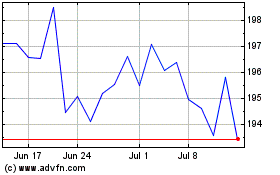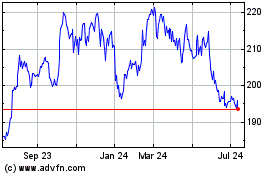Exchange Leaders Warn On Regulatory Arbitrage
October 11 2011 - 4:07PM
Dow Jones News
Wholesale reform of the global financial sector is raising
concern among some exchanges and traders about the impact of
domestic regulatory moves on international competitiveness.
With Dodd-Frank reforms and parallel changes in Europe moving at
different paces, some executives are concerned about what is known
as regulatory arbitrage, with business flowing to countries that
have cheaper and less-restrictive oversight.
U.S.-based executives have been the most vocal about the
potential for trading--and jobs--to move if other countries
introduce rules for the derivatives sector that are less onerous
than those laid down by the Dodd-Frank legislation.
"These businesses will shift overseas dramatically," said Terry
Duffy, chairman of CME Group Inc. (CME), in an interview. "That is
one of the risks you have of being a [regulatory] leader."
While lawmakers and regulators in the U.S. and the European
Union agree on broad reform principles--such as greater
transparency and funneling more trades through clearinghouses to
reduce systemic risk--gaps are emerging.
"Some of the differences are substantial," said Anthony
Belchambers, chief executive of the London-based Futures and
Options Association, the main trade group for the derivatives
sector in Europe.
Belchambers, speaking in a panel debate at the annual Futures
and Options Association conference in Chicago, said he had
scribbled down 14 or so areas of divergence. More concerning, said
Belchambers, is the push by some regulators to extend their reach
into other markets because of the global nature of the
business.
"This thing is in danger of getting out of hand," he said.
CME CEO Craig Donohue said the "extra-territoriality" impact of
Dodd-Frank was one of the greatest areas of uncertainty in the
yet-to-be-finalized Dodd-Frank reform agenda. "It's a whole can of
worms," Donohue said during a panel discussion among exchange
CEOs.
Others are more sanguine about the potential for multi-speed
regulation to see trading and jobs shift among jurisdictions, at
least for long.
Andreas Preuss, CEO of the Eurex derivatives arm of Deutsche
Boerse AG (DB1.XE), said in an interview that any imbalances
created by regulators would quickly be eliminated if traders moved
business.
-By Doug Cameron, Dow Jones Newswires; 312-750-4135;
doug.cameron@dowjones.com
CME (NASDAQ:CME)
Historical Stock Chart
From Jun 2024 to Jul 2024

CME (NASDAQ:CME)
Historical Stock Chart
From Jul 2023 to Jul 2024
